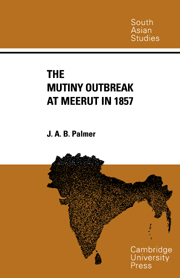Book contents
- Frontmatter
- Contents
- Introduction
- 1 CHAPĀTĪS
- 2 GREASED CARTRIDGES
- 3 THE PRESIDENCY DIVISION, FEBRUARY TO MAY
- 4 REGIMENTS AND OFFICERS AT MEERUT
- 5 MEERUT CANTONMENT IN 1857
- 6 THE FIRING PARADE OF 24 APRIL AND ITS SEQUEL
- 7 THE OUTBREAK: (a) The Native Infantry Lines
- 8 THE OUTBREAK: (b) The Native Cavalry Lines
- 9 THE OUTBREAK: (c) The Bazar Mobs
- 10 THE OUTBREAK: (d) The European Troop Movements and the European Lines
- 11 THE HANDLING OF THE EUROPEAN TROOPS
- 12 TO DELHI
- 13 CONCLUSIONS
- Notes and References
- Index
- Plan of Meerut Cantonment in 1857
7 - THE OUTBREAK: (a) The Native Infantry Lines
Published online by Cambridge University Press: 24 October 2009
- Frontmatter
- Contents
- Introduction
- 1 CHAPĀTĪS
- 2 GREASED CARTRIDGES
- 3 THE PRESIDENCY DIVISION, FEBRUARY TO MAY
- 4 REGIMENTS AND OFFICERS AT MEERUT
- 5 MEERUT CANTONMENT IN 1857
- 6 THE FIRING PARADE OF 24 APRIL AND ITS SEQUEL
- 7 THE OUTBREAK: (a) The Native Infantry Lines
- 8 THE OUTBREAK: (b) The Native Cavalry Lines
- 9 THE OUTBREAK: (c) The Bazar Mobs
- 10 THE OUTBREAK: (d) The European Troop Movements and the European Lines
- 11 THE HANDLING OF THE EUROPEAN TROOPS
- 12 TO DELHI
- 13 CONCLUSIONS
- Notes and References
- Index
- Plan of Meerut Cantonment in 1857
Summary
On the evening of 9 May a native officer of the 2nd Troop of the 3rd L.C. came to the bungalow of Lieutenant Gough, the temporary troop commander, under pretence of making up the accounts. After a time he informed Gough that a mutiny of the native troops at Meerut would take place on the following day; the native infantry was going to rise, the cavalry would do the same and release their comrades from the jail. Gough went at once to his Colonel and reported this, but Carmichael-Smyth treated the report with contempt and reproved Gough for listening to such idle words. That same evening Gough met the Brigadier and told him the story, but Archdale Wilson also was incredulous. Two of the deponents before Major Williams, the sheristadār (court registrar) and one of the tahsildārs (sub-divisional revenue official) at Meerut, stated that it was rumoured on the 9th that the sepoys would mutiny. On the evening of the 9th the Commissioner (Mr Greathed) and his wife were dining with Colonel Custance of the Carabiniers: she told him of a report, which she had probably heard through her servants, that placards had been seen in the city calling on all true Mussulmans to rise and slaughter the English.
There is next day, 10 May, some evidence that at about 2 p.m. a prostitute in the Sudder Bazar was told by a sepoy that the native troops would mutiny that day. The evidence is not very satisfactory.
- Type
- Chapter
- Information
- The Mutiny Outbreak at Meerut in 1857 , pp. 70 - 79Publisher: Cambridge University PressPrint publication year: 1966



